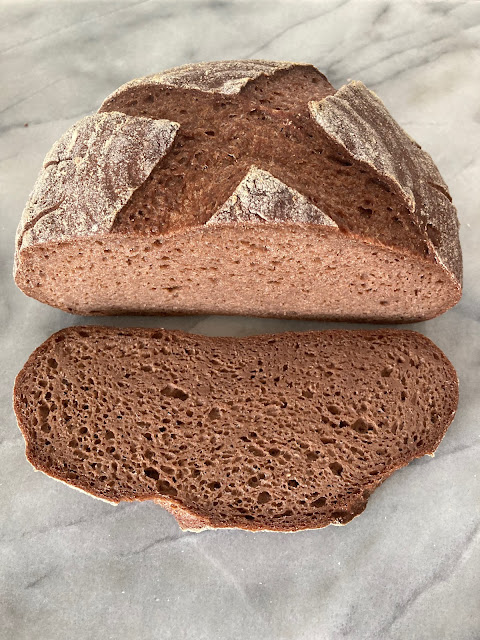The Best Whole Grain Blueberry Scones
 These whole-grain scones are gluten-free and delicious. Have them with your afternoon tea or for a hearty breakfast treat. These scones are made with the traditional method and all the traditional ingredients - minus the gluten. What is gluten anyway, except an impediment to soft, delicate scones? With wheat flour you have to be careful not to manipulate pastries too much for fear the gluten will make them tough. You don't have to worry about that with these gluten-free scones: they will come out soft and delicious.
These whole-grain scones are gluten-free and delicious. Have them with your afternoon tea or for a hearty breakfast treat. These scones are made with the traditional method and all the traditional ingredients - minus the gluten. What is gluten anyway, except an impediment to soft, delicate scones? With wheat flour you have to be careful not to manipulate pastries too much for fear the gluten will make them tough. You don't have to worry about that with these gluten-free scones: they will come out soft and delicious.The secret to getting the right texture of scones is to keep everything cold while mixing. Some people put the pastry cutter, butter, and bowl in the freezer for a few minutes before starting to keep everything cold enough. The coldness is necessary so the chunks of butter can form little pockets in the dough when they melt away in the oven. This creates air space for the baking soda to do its work and rise. The scone should come out a soft, flaky pastry.
I have provided the ingredients in metric for my international audience as well as those conscientious bakers who like to weigh their ingredients for better accuracy.

Heat oven to 400 F/ 205 C.
Mix together in a large bowl:
3/4 cup Teff flour (122 g)
3/4 cup Sorghum flour (106g)
2 Tablespoons Tapioca flour (12g)
2 Tablespoons Potato starch (17 g)
1/3 cup sugar (65g)
1 Tbsp baking powder (make sure it's GF)
1/2 tsp salt
1/2 tsp xanthan gum
Cut into pieces and drop in:
6 Tbsp cold unsalted butter (90g)
Cut the butter in with a pastry blender or two knives, coating the pieces with flour as you go, until the largest pieces of butter are pea-sized. Keep this mixture cold, chilling it in the freezer if the butter starts to soften.
Whisk together in a separate bowl:
3/4 cup chilled cream (175 ml)
1 egg
1-2 tsp orange or lemon zest (optional)
1/3 cup fresh blueberries (55g)
Add the wet ingredients to dry the ingredients. Stir until the mixture starts to hold together, then gently knead the dough a few times with your hands. If the dough is too sticky to handle once it's combined, you can add about a tablespoon of flour to coat the surface of the dough for easier handling. If the dough seems dry and won't hold together easily, add 1-2 Tbsp more cream and knead it in, being careful that your butter chunks don't melt into the dough. If the dough starts to get too warm during mixing, chill it in the freezer for a few minutes before proceeding.
Put the dough on a large baking sheet. Gently push the dough into a flat disk about one inch high. Cut into eight equal pieces and arrange them on the baking sheet about one inch apart. Brush some cream onto the tops of the scones. Bake for 12 minutes, or until a toothpick inserted into the middle of one comes out clean.
Let cool slightly, then enjoy your scones! These can be eaten warm out of the oven, or at room temperature.
Looking for a vegan scone recipe? Try my my Gluten-free Vegan Scones.
If you liked this recipe, you might also like:
Visit the Gluten-free Homemaker's blog carnival for more gluten-free recipe ideas!




Comments
Because I was out of some of your ingredients, and for allergies, I did substitute a bit: Cornstarch in place of the potato starch, Earth Balance sticks for the butter, small, frozen red raspberries bc the blueberries were gone! Lastly, I had no cream or coconut cream, so I started with 1/4 cup of soymilk, and added per your directions. Half a cup did the trick. Not as rich as the cream, but the dough worked up, chilled, and baked just as the recipe says. And you're right- the whole grain flours are delicious.
It's a testament to your work on this recipe that I could substitute like I did, and these still baked up deliciously. thank you so much.